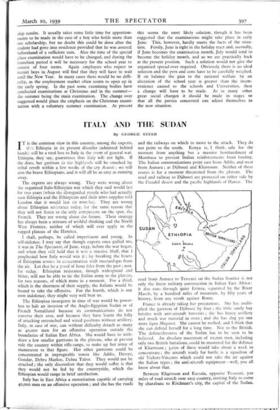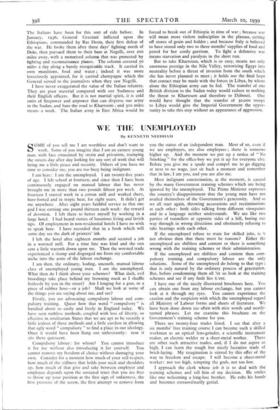ITALY AND THE SUDAN
By GEORGE STEER
T is the common view in this country, among the experts, that Ethiopia in its present disorder (admitted behind hands) will be a total loss to Italy in the event of general war. Ethiopia, they say, guarantees that Italy will not fight. If she does, her garrison in the highlands will be smashed by tribal revolt within a few weeks of the cry Avanti ; we will arm the brave Ethiopians, and it will all be as easy as running away.
The experts are always wrong. They were wrong about the organised Italo-Ethiopian war which they said would last for two years (when the disregarded people who had actually seen Ethiopia and the Ethiopians and their arms supplies told London that it would last six months). They are wrong about Ethiopian resistance today, for the same reason that they will not listen to the only competents on the spot, the French. They are wrong about the future. Their strategy has always been a mixture of wishful thinking and the North West Frontier, neither of which will ever apply to the rugged plateau of the Hatnites.
I shall, perhaps, be called impertinent and young. In self-defence, I may say that though experts once gulled me, it was in The Spectator, of June, 1935, before the war began, and when they still held that it was a massive bluff, that I prophesied how Italy would win it ; by breaking the hearts of Ethiopian armies in concentration with mustard-gas from the air. Let that be a proof of bona fides from the past ; now for today. Ethiopian resistance, though widespread and bitter, will not be able to tie the Italian army to the plateau, for two reasons, of which more in a moment. For a third, which is the shortness of their supply, the Italians would be bound to take the offensive. For the fourth, which is our own indolence, they might very well beat us.
The Ethiopian insurgents in time of war would be power- less to halt an invasion of the Anglo-Egyptian Sudan or of French Somaliland because its communications do not traverse their area, and because they have learnt the folly of attacking entrenched and wired positions without artillery. Italy, in case of war, can without difficulty detach as many as 40,000 men for an offensive operation outside the boundaries of Italian East Africa. She would have to with- draw a few smaller garrisons in the plateau, who at present rule the country within rifle-range, to make up her army of manoeuvre to that figure. Her other garrisons could be concentrated in impregnable towns like Addis, Dessye, Gondar, Debra Markos, Debra Tabor. They would not be attacked ; the only discomfort that they would suffer is that they would not be fed by the countryside, which the Ethiopian would range in brief satisfaction.
Italy has in East Africa a motorisation capable of carrying 40,000 men on an offensive operation ; and she has the roads and the railways on which to move to the attack. They do not point to the south. Kenya is, I think, safe for the moment from anything but a massive bombardment of Mombasa to prevent Indian reinforcements from landing. The Italian communications point east from Addis, and west from Asmara ; at Djibouti and Khartoum. Neither of these routes is for a moment threatened from the plateau. The road and railway to Djibouti are protected on either side by the Danakil desert and the pacific highlands of Harrar. The road from Asmara to Tessenei on the Sudan frontier is not only the finest military construction in Italian East Africa : it also runs through quiet Eritrea, separated by the River Marcb, by a hundred miles of mountain, by fifty years of history, from any revolt against Rome.
France is already taking her precautions. She has multi- plied the garrison of Djibouti by four ; the little sandy bay bristles with anti-aircraft batteries ; she has heavy artillery and much war material in store ; and she has dug yet one more ligne Maginot. She cannot be rushed, and I think that she can defend herself for a long time. Not so the British. The defencelessness of the Sudan has to be seen to be believed. An absolute maximum of 10,000 men, including only two British battalions, could be mustered for the defence of Khartoum ; 3,000 of these would take about a week to concentrate ; the aircraft ready for battle is a squadron of old Vickers-Vincents which could not take the air against the Italian types ; the anti-aircraft equipment—well, you all know about that.
Between Khartoum and Kassala, opposite Tessenei, 300 miles of road stretch over easy country, inviting Italy to come by charabanc to Kitchener's city, the capital of the Sudan. The Italians have been for this sort of ride before. In January, 1936, General Graziani inflicted upon the Ethiopians, commanded by Ras Desta, their first defeat of the war. He broke them after three days' fighting north of Dolo, then pursued them to their base at Negelli, over 200 miles away, with a motorised column that was protected by fighting and reconnaissance planes. The column covered 50 miles a day along a barely recognisable track. It carried its own munitions, food and water ; indeed it was more luxuriously appointed, for it carried champagne which the General served to the journalists when they saw Negelli.
I have never exaggerated the value of the Italian infantry. They are poor material compared with our Sudanese and their English officers. But it is not martial spirit, it is cold units of firepower and airpower that can disperse our army in the Sudan, and bare the road to Khartoum ; and 300 miles means a week. The Italian army in East Africa would be forced to break out of Ethiopia in time of war ; because war will mean more violent indiscipline in the plateau, cutting off stores of grain and fodder ; and because Italy is believed to have stored only two to three months' supplies of food and petrol for her costly garrison. To fight a defensive war means starvation and paralysis in the short run.
But to take Khartoum, which is so easy, means not only enormous prestige in the Nile Valley, terrorising Egypt into neutrality before a threat of invasion from the south which she has never planned to meet ; it holds out the final hope that contact may be made with the forces in Libya, by whom alone the Ethiopian army can be fed. The transfer of one British division to the Sudan today would reduce to nothing the threat to Khartoum and therefore to Djibouti. One would have thought that the transfer of 30,000 troops to Libya would give the Imperial Government the oppor- tunity to take this step without an appearance of aggression.











































 Previous page
Previous page